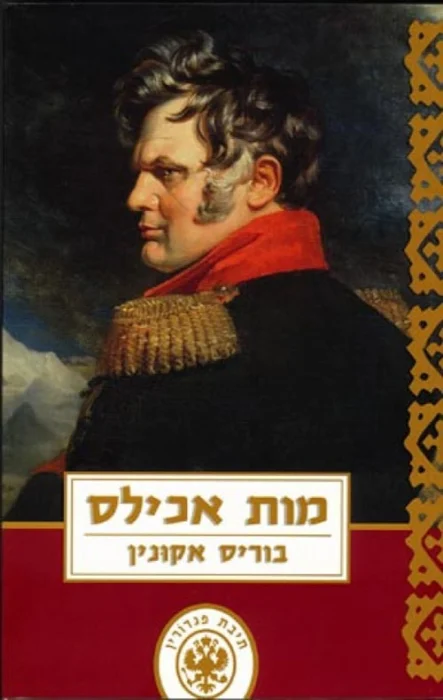Please scroll down for an English review.
בספר הרביעי בסדרת פנדורין, מות אכילס, אראסט פנדורין חוזר מרחוק, תרתי משמע. אחרי שנים ביפן הוא שב לרוסיה, ארץ מוכרת אך זרה, רוויה תככים, פוליטיקה וחנופה לשלטון. לצדו מַסָה, עוזרו היפני, שהפך לשותף נאמן ואילם־כמעט למסעותיו.
כבר ביום חזרתו נחשף פנדורין לתעלומה חדשה: גופתו של גנרל סובולב, “הגיבור הלאומי” שניצח במלחמות, נמצאת מתה בחדר מלון. המוות נראה טבעי, לב חלש, אולי, אבל פנדורין, שכבר אינו רק בלש אירופי אלא גם לוחם מאומן בעל אינטואיציה יפנית, מריח שמשהו אינו כשורה.
אל תוך התמונה נכנסת אישה מסתורית, המוסרת מידע על תנועותיו האחרונות של הגנרל ומתגלה כמאהבתו. יחד עם זאת מתברר כי תיק עור ובו מיליון רובלים נעלם. וכך, החקירה הופכת למרדף כפול: אחרי רוצח ואחרי תיק, אבל גם אחרי האמת עצמה.
החלק הראשון של הספר מתנהל כמו בלש קלאסי, חקירה קפדנית ומלאת רמזים בסגנון שרלוק הולמס, אבל באמצע הדרך בוריס אקונין מחליף כיוון: החלק השני מוקדש כולו לדמות בשם אחימאס, רוצח־פילוסוף שמהלך על הגבול שבין גאונות לשיגעון. רק בסיום הספר, שני הקווים יתאחדו במעשה לוליינות ספרותי מרשים, אולי מדי.
וזו בדיוק הבעיה: האינטלקטואליות של אקונין מתחרה בהנאה מהעלילה. מות אכילס כתוב היטב, מבריק במבנהו, אבל לעיתים קרובות נדמה שהסופר מתאהב במורכבות על חשבון הקורא. הרגע שבו פנדורין ואחימאס סוף־סוף נפגשים הוא רגע של “אבוי והוי, אני לא מאמינה למקרא עיניי”, לא משום שהוא מפתיע, אלא משום שהוא כמעט בלתי סביר.
ועדיין, גם כשהוא מ, אקונין נשאר שען מדויק: כל גלגל מסתובב במקומו, כל פרט מתחבר לאחרון, גם אם לא לטעמנו.
זהו רומן בלשי אלגנטי, ארכאי במתכוון, שבו רוסיה עצמה היא התעלומה הגדולה מכולן.
מות אכילס/ בוריס אקונין
הוצאת ידיעות ספרים, 2007, 371 עמ'
דירוג SIVI –
איכות אודיו –

סידרת פנדורין 4#
In the fourth Erast Fandorin novel, The Death of Achilles, the famous sleuth returns from Japan to a Russia that feels both familiar and utterly changed. With him is Masa, his loyal Japanese assistant, silent but perceptive.
On the very day of his arrival, Fandorin faces a new mystery: the body of General Sobolev, a national hero celebrated for his victories, is found in a hotel room. The death appears natural, a weak heart, perhaps, but Fandorin, sharpened by his years in Japan, senses something deeply wrong.
A mysterious woman soon appears, revealing herself as the general’s mistress. A leather briefcase containing a million rubles has vanished. And so begins a double investigation: one for a murderer, and one for meaning itself.
The first half of the novel reads like a classic detective story: methodical, elegant, filled with clues. But midway through, Akunin shifts the stage entirely: the second half is devoted to a man known as Achimas, a killer-philosopher whose mind is as dangerous as his blade. Only in the final act do the two strands merge in an acrobatic twist that is as dazzling as it is divisive.
And that’s the point: The Death of Achilles is brilliant yet frustrating. Akunin’s intellectual precision sometimes overwhelms the emotional thrill. The long-awaited meeting between Fandorin and Achimas is less a climax than a shock of disbelief, the kind that makes you mutter, “Oh no, he didn’t just do that.”
Still, even when it stumbles, Akunin remains a master watchmaker. Every gear turns, every mechanism fits, even if the beauty of the design outshines the heart of the story.
A polished, cerebral mystery and a portrait of Russia itself as the ultimate enigma.
לגלות עוד מהאתר Sivi's Books
Subscribe to get the latest posts sent to your email.

